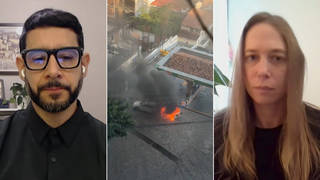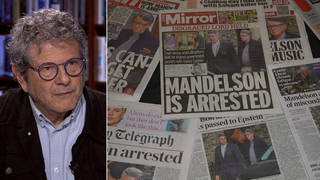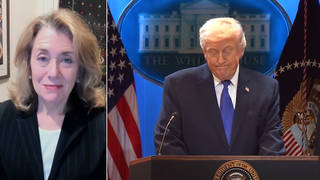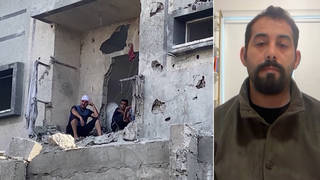
Guests
- Sarah Leah Whitsonexecutive director of DAWN, an organization working to reform U.S. foreign policy in the Middle East.
- Akbar Shahid Ahmedsenior diplomatic correspondent for HuffPost.
We look at President Donald Trump’s diplomatic visit to the Middle East and discuss his administration’s foreign policy in the region with Akbar Shahid Ahmed, senior diplomatic correspondent for HuffPost, and Sarah Leah Whitson, executive director of DAWN. As Trump sells U.S. military power in the Gulf in exchange for investments in U.S. businesses, they warn that Trump’s transactional business philosophy is spreading to the administration’s dealings around the world. As Whitson puts it, “if you can pay, then you can play.” This approach extends to the new Syrian government, as Trump pledges to lift sanctions on the country. However, explains Ahmed, while the thawing of relationships between the U.S. and Arab states has the added effect of divergence from tight-knit U.S.-Israel coordination, these changes can be attributed to Trump’s “America First” agenda, rather than any concern for Palestinians, whom Trump is happy to allow Israel to “pummel.”
Transcript
AMY GOODMAN: President Trump has arrived in Qatar after two days in Saudi Arabia. Earlier today, President Trump met in Riyadh with Syria’s new president, Ahmed al-Sharaa, the former al-Qaeda leader who helped topple the regime of Bashar al-Assad last December. During the meeting, Trump urged al-Sharaa to normalize ties with Israel and join the Abraham Accords. Trump also asked the Syrian leader to deport Palestinians he described as, quote, “terrorists.” After the meeting, Trump said, quote, “We are currently exploring normalizing relations with Syria’s new government,” unquote. The meeting took place hours after Trump pledged to lift U.S. sanctions on Syria in a major policy shift.
PRESIDENT DONALD TRUMP: In Syria, which has seen so much misery and death, there is a new government that will, hopefully, succeed in stabilizing the country and keeping peace. … That’s why my administration has already taken the first steps toward restoring normal relations between the United States and Syria for the first time in more than a decade. … I will be ordering the cessation of sanctions against Syria in order to give them a chance at greatness.
AMY GOODMAN: Much of President Trump’s trip to the Gulf has focused on securing new deals for U.S. companies. On Tuesday, the U.S. and Saudi Arabia signed a new $142 billion arms deal, in what the White House has called “the largest defense cooperation agreement” Washington has ever achieved. Trump claimed Saudi Arabia has pledged to invest $1 trillion in the United States.
PRESIDENT DONALD TRUMP: And with this trip, we’re adding over $1 trillion more in terms of investment and investment into our country and buying our products. And, you know, nobody makes military equipment like us. We have the best military equipment, the best missiles, the best rockets, the best everything, best submarines, by the way.
AMY GOODMAN: President Trump is now in Qatar and then will head to the United Arab Emirates. He’s facing increasing bipartisan criticism over reports that Qatar is preparing to give him a $400 million luxury plane known as “the flying palace.”
We’re joined now by two guests. In Washington, D.C., Akbar Shahid Ahmed, the senior diplomatic correspondent for HuffPost, is with us. His latest piece is headlined “A Moment of Truth in the Middle East for Donald Trump — and Steve Witkoff.” His forthcoming book on the Biden administration and Gaza is titled Crossing the Red Line. And here in New York, Sarah Leah Whitson is with us, the executive director of DAWN, an organization working to reform U.S. foreign policy in the Middle East.
We welcome you both back to Democracy Now! Sarah Leah Whitson, let’s begin with you. Your assessment of what’s happened over the last two days, both his visits with these three countries — he’s about to go to the United Arab Emirates, just landed in Qatar, in Doha — but also what this means for Israel?
SARAH LEAH WHITSON: Well, this is a very volatile moment in the Middle East, and we’ve seen some pivots that we really haven’t seen for decades in terms of independent U.S. decision-making in the Middle East. President Trump has ended sanctions on Syria, he’s reached a truce in Yemen with the Houthis, he’s declared that he’s going to have diplomatic negotiations with Iran — all without the consent or veto of Israel, which previously existed. And meanwhile, he’s dramatically expanding America’s economic ties to the Gulf states, declaring that if you can pay, then you can play — the massive announcement of trade deals with Saudi Arabia, $600 billion, the largest weapons deal, $148 billion with Saudi Arabia — and really no talk at all of a normalization with Israel as any kind of a condition, including for the development of a civilian nuclear plant. What we still don’t know is what Saudi is going to charge the United States in return, whether there’s going to be a defense pact, which is, of course, what Saudi Arabia has long been looking for.
JUAN GONZÁLEZ: And, Sarah, what about all of the CEOs of major U.S. corporations that have also headed to the Middle East, as well, during these days? What do you make of that?
SARAH LEAH WHITSON: Well, I mean, the days of Saudi isolation in the wake of the murder of Jamal Khashoggi, when some of these very same business leaders absented themselves from appearing in Saudi Arabia, are long over. And now I think American companies are looking to cash in on the billions of dollars of the Saudi Public Investment Fund, the Emirati public investment fund, the Qatari public investment fund. This is a boondoggle for American businesses, because the Gulf states understand that in order to continue to secure U.S. protection, they must expand their investments in U.S. businesses.
JUAN GONZÁLEZ: And in terms of the ceasefire in Yemen that Trump has implemented, as well as other actions he’s taken that seem to be marginalizing Israel and the Netanyahu administration, what do you make of that?
SARAH LEAH WHITSON: Well, I mean, the ceasefire with Yemen and the Houthis is an excellent development, and I wish that every other American president had ended failed catastrophic wars after a mere two months, which is the deadline that President Trump imposed on this foolish incursion into Yemen, which has put us back exactly where we were before the incursion started. This was never a conflict that the United States was pursuing in U.S. interests, but clearly to support Israel and to protect Israel. I think it’s a very important signal that President Trump is now making decisions that more closely align with U.S. interests than with Israel’s interests. I think it’s very notable that the Houthis launched an attack on Israel a mere day after this ceasefire was announced, making clear, underlining, really, that the ceasefire does not include sustaining or suspending attacks on Israel.
AMY GOODMAN: Akbar Shahid Ahmed, you’ve written an extensive piece about the meaning of this trip. And again, at this point of this broadcast, President Trump has landed in Doha, but he just met with the Syrian president and said they’re dropping all sanctions against Syria, which also includes, presumably, against he himself, against the Syrian president. If you can talk about the significance of this moment and what you thought was most significant in the meetings in Saudi Arabia with the crown prince and the investment, a massive meeting of hundreds of CEOs? You see Crown Prince Mohammed bin Salman sitting right next to Elon Musk.
AKBAR SHAHID AHMED: Right, Amy. But with the meeting with President Sharaa, which is the first meeting between an American president and a Syrian president in more than two decades, that’s a real signal that Trump, as Sarah Leah said, is pursuing a policy that’s a little different than what the Israelis certainly would like. This is the culmination of a monthslong battle within Trump’s own administration that I’ve been reporting on, where there are still many neoconservatives, kind of pro-Israel hard-liners, the folks who have been in the Republican ecosystem for many, many years, who were not supportive of this kind of policy on Syria. So, for President Trump to be in Saudi Arabia publicly embracing the Syrian president, not just saying hello, which is what the White House told us he was going to do yesterday — he actually had a more extensive conversation and has expressed a lot of hopes for U.S.-Syria engagement — I think that’s quite striking, right? It’s certainly showing you a U.S. approach that, as some regional sources have described to me, they see as more even-handed, because they believe now, rather than under the Biden administration, certainly, but even administrations before that, there was a U.S. policy very much conceived not just in coordination with Israel, but often shaped by an assumption about how Israel would react — right? — which was kind of shaping how officials were having even internal conversations.
I will hazard, though, I think what’s really significant to remember is who’s not being talked about. There was also some chatter that Palestinian Authority President Mahmoud Abbas might come to Saudi Arabia. That didn’t happen. Right? And so, even while President Trump is in Saudi, is making these conversations about peace between the U.S. and Syria, Syria and Israel, Gaza is still being pummeled, and we’re still seeing a blockade of more than 70 days there, where one in five Gazans is facing extreme starvation. There hasn’t been food. There hasn’t been fuel. There hasn’t been medicine. And all of that is backed by the U.S. So, President Trump is putting forward this image that, “Yes, I’m not necessarily aligning with Israel at all times”; at the same time, he’s making significant concessions and approvals to Israeli Prime Minister Benjamin Netanyahu’s plan to continue the war, continue pummeling Palestinians.
JUAN GONZÁLEZ: And, Akbar, what do you make — there’s been a lot of press attention to this donation of the royal family of Qatar of a $400 million luxury 747 plane to President Trump, but to the United States. What’s your take on this?
AKBAR SHAHID AHMED: I think, Juan, it’s going to be a really serious wrinkle in President Trump’s attempt at diplomacy. A lot of what he’s trying to do, whether it’s weapons sales, whether it’s a potential defense treaty with Saudi Arabia, does have to go through Congress. I think this is going to become a significant issue. Democrats are going to latch onto this, claiming corruption, and some Republicans are already uncomfortable with it.
I think the concern about this is not just about an ethical appearance of taking a gift from the Qataris, which has its own concerns. It’s also about policy making and real strategic danger. When I’ve been talking to regional officials, Western officials, U.S. officials, they’re saying, “Look, Trump’s deal-making approach is part of why he kind of plays so well with these Arab states, that are very transactional, don’t want to hear moralistic rhetoric about human rights or even long-term strategy.” They want to just pay to play, as Sarah Leah put it. But does that lead to just short-term wins, right? Or does that lead to the personal and private mixing in ways where President Trump can walk away saying, “I feel great. I got this plane, and maybe I’ve got some deals. What’s the long-term strategic danger there, you know?” And a lot of my reporting on Trump and his envoy to region, Steve Witkoff, has focused on how they’re pursuing really unconventional, really personalistic dealings with these leaders. In one instance, the leader of the United Arab Emirates, Steve Witkoff, who’s Trump’s envoy, had a 10-hour meeting with him, where he didn’t tell any other U.S. officials what was discussed. So, that kind of policy-making process, I think, is the risk behind this extreme, personalized and potentially corrupt relationship.
AMY GOODMAN: Ahmed, I wanted you to talk — Akbar, I wanted you to talk more about who Steve Witkoff is. I mean, this trip started before President Trump got on the plane to Saudi Arabia, right?
AKBAR SHAHID AHMED: Yeah.
AMY GOODMAN: I mean, it started with Edan Alexander —
AKBAR SHAHID AHMED: Yeah.
AMY GOODMAN: — the Israeli American hostage, who Israel didn’t negotiate to get him out. The U.S. negotiated directly, presumably with Witkoff, with Hamas to get him out. And he didn’t meet with Netanyahu, and he’s coming to the United States. The significance of this complete sidelining, icing out of Israel that began before Saudi Arabia?
AKBAR SHAHID AHMED: Absolutely, Amy. Witkoff has been the man shaping the region, not just since January, when Trump took office, but, to a large extent, in November and December, in those waning months of the Biden administration. Witkoff was the person who really negotiated that Gaza ceasefire, that did last from January to March. Since then is when you’ve seen the beginning of the sidelining you talk about. Based on my sources, I’ve understood that Witkoff has actually personally told people he felt played by Netanyahu, because it was Israel that broke the ceasefire, went back into Gaza and really undercut what Witkoff and, by extension, President Trump were trying to do.
So, this kind of sense of “we don’t have to coordinate with the Israelis” is very much linked to Witkoff’s view that he is a personally empowered envoy of Trump, he’s a personal friend of Trump’s, and, importantly, he’s personally wealthy, and he’s not political, right? So, compared to, say, U.S. officials in previous administrations, or even in this one, he’s not someone who’s looking at “how do I advance international security establishment for years to come? How does challenging Israel potentially put me at risk?” And so, that’s something where, talking to a lot of regional officials, U.S. officials, they feel he is able to be a little more even-handed and a little less driven by a fixation on Israel. But I think that also puts him in the crosshairs of a lot of the pro-Israel kind of advocacy ecosystem that does exist, right? And we’ve seen that come out. Already, there’s been a lot of attacks on Witkoff personally, his business ties with Qatar, his potentially, you know, unconventional tactics.
But Witkoff very much has the trust of the president personally, and I discovered this kind of reporting on him. Taking criticisms to the White House, they are ardently supporting him. And importantly, not just kind of lower-level officials, really high-ranking people, like Donald Trump Jr., the president’s son, and Vice President JD Vance, are pushing Witkoff as an avatar almost of what they describe as a different kind of Trump foreign policy, saying, “We are promoting a foreign policy that will bring peace to the region.”
Really important to remember that foreign policy, of course, involves, as I said, continued pummeling of Gaza and huge weapons deals to regimes that have pursued huge wars. But it is one that isn’t necessarily being driven by intense U.S. military entanglement, particularly with Israel. And I think that pattern will continue. You’ll see that mostly play out in the next few weeks. I think there’s a looming deadline and fight over Iran diplomacy, which Steve Witkoff, the president’s envoy, is also leading — again, very controversial for Israel, very controversial for national security hawks. I think that’ll be a really intense kind of battle over what Witkoff is willing to do with Iran.











Media Options